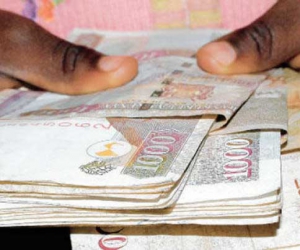
Borrowers have been slapped by a sharp rise in interest rates that are now racing towards 30 per cent, punished by the government’s insatiable borrowing spree, which is causing turbulence in the money markets.
The latest round of rate hikes has been attributed to a liquidity crunch engineered by the Central Bank of Kenya (CBK) to stabilise the volatile currency and contain inflation.
But it is consumers who are now carrying the burden of the turbulence in the economy, as they start receiving notifications from financial institutions in the latest round of rate hikes.
Commercial banks have nearly doubled interest rates in the last three months, responding almost immediately to the tightening of liquidity in the market, as the Central Bank of Kenya (CBK) battles to reduce money in supply to stabilise the shilling and tame inflation.
Banks are now notifying their consumers of the new rates, only offering them a ‘soft landing’ of extending their monthly repayments.
“Due to the prevailing challenging economic conditions and subsequent tightening of the monetary policy by the Central Bank of Kenya (CBK), it has become necessary for Standard Chartered Bank Kenya Ltd to review its current pricing mechanism on our Kenya Shilling credit facilities,” Standard Chartered Bank Kenya said in its email notification to its customers.
The latest wave of interest rate adjustments by lenders also affects home owners, who will be forced to dig deeper into their pockets to finance their mortgages.
Consumers are set to start struggling to repay the loans from next month, with the ‘kinder’ banks offering to extend the repayment period as a ‘softer landing for consumers’.
Standard Chartered Bank says the new rate of 26.4 per cent will be effective from November 19, 2015. Other banks that have raised interest rates and other fees include Commercial Bank of Africa (CBA) and Barclays Bank, which is reported to soon unveil its new pricing for its various loan portfolios. These banks are also reported to be reviewing the loan pricing and will be notifying their customers in due course.
The latest round of hikes is set to reignite debate on how swiftly banks move to raise the rates when they are presented with an opportunity but drag their feet to reduce them once the cost of funds comes down.
Banks were charging borrowers an average of 15.26 per cent before their risk premium. When other charges are added, coupled with a borrower’s risk profile, the rates have been averaging at over 20 per cent.
CBA has increased this to 18.9 per cent, which will see borrowers pay over 24 per cent when their risk profiles are factored.
On its part, Barclays Bank is seeking regulatory approvals to change its tariffs, following in the footsteps of NIC, Stanchart and CBA who have also revised their fees.
The Government’s appetite for borrowing from the domestic market is also partly to blame for the current jump in interest rates given that it is offering interests of over 20 per cent for its Treasury bill as it borrows from the domestic market.
To remain competitive, banks have been forced to match what the Government is offering for Treasury bills and bonds in a bid to retain the large depositors on their books, instead of lending to the Treasury, which they consider attractive as it is risk-free and provides low administration costs.
Last week for instance, Treasury paid a record 21.35 per cent for the 91-day Treasury Bill as pressure to borrow more led investors to demand higher returns. The CBK, which regulates the sector, says it has noted that the short-term interest rates are spiralling out of control.
“We shall engineer a soft landing for interest rates. The yield curve is inverted and this means that the short-term interest rates need to come down,” CBK Governor Patrick Njoroge said in a press conference on Wednesday.
Dr Njoroge says the CBK will ensure that there is enough liquidity “to ensure there is no stress” in the market.
It has also emerged that the regulator has abandoned the publishing of interest rates being offered by banks, in another setback to consumers who could use such information to decision where it’s cheap to borrow.
Publishing the rates was a critical pressure point for lenders given that consumers would know which was the most expensive bank.
An insider told The Standard that banks protested the first report on grounds that it did not compare them favourably with their peers.
 The Standard Group Plc is a multi-media organization with investments in media
platforms spanning newspaper print operations, television, radio broadcasting,
digital and online services. The Standard Group is recognized as a leading
multi-media house in Kenya with a key influence in matters of national and
international interest.
The Standard Group Plc is a multi-media organization with investments in media
platforms spanning newspaper print operations, television, radio broadcasting,
digital and online services. The Standard Group is recognized as a leading
multi-media house in Kenya with a key influence in matters of national and
international interest.
 The Standard Group Plc is a multi-media organization with investments in media
platforms spanning newspaper print operations, television, radio broadcasting,
digital and online services. The Standard Group is recognized as a leading
multi-media house in Kenya with a key influence in matters of national and
international interest.
The Standard Group Plc is a multi-media organization with investments in media
platforms spanning newspaper print operations, television, radio broadcasting,
digital and online services. The Standard Group is recognized as a leading
multi-media house in Kenya with a key influence in matters of national and
international interest.










